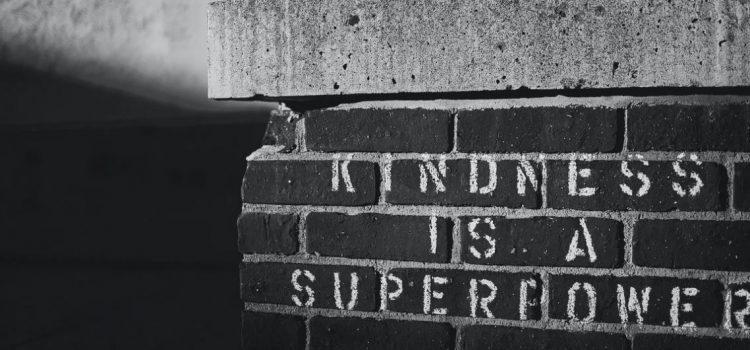

This article is an excerpt from the Shortform book guide to "Who Will Cry When You Die?" by Robin Sharma. Shortform has the world's best summaries and analyses of books you should be reading.
Like this article? Sign up for a free trial here .
Do you want to know how to spread kindness? How can practicing kindness help you gain control of your life?
The thought of spreading kindness can sometimes be easier said than done. When we get caught up in the everyday ebb and flow of life, it’s easy to forget to take a step back and to do something nice for ourselves or others. However, the act of spreading kindness can actually help pull you out of that everyday routine, reduce stress, and release negative feelings.
Here are six tips for spreading kindness every day.
Practice Kindness
Self-help guru Robin Sharma discusses kindness as a tactic to develop your control over your life and steer it toward your purpose. We’ll first describe why Sharma feels kindness is integral to pursuing your purpose. We’ll then cover six ways in which you can spread kindness to yourself and others.
Be Kind to Yourself and Others Every Chance You Get
Sharma’s recommendation is to simply be kind to yourself and others as often as possible. When you do this, you more effectively pursue your altruistic purpose in life. Let’s say your purpose is to add value to your community. When you perform community service with a kind disposition, you add more value than if you had a sullen or even neutral disposition.
(Shortform note: Beyond enabling you to more effectively pursue your purpose, practicing self-kindness has other benefits. Being kind to yourself turns off your body’s threat response, thereby calming your heart rate and reducing damage to your immune system. In this relaxed, unthreatened state, your body can regenerate and heal. Being kind to others, in turn, can have a positive impact on your mood and self-esteem.)
In his book Who Will Cry When You Die?, Sharma teaches how to spread kindness:
Strategy #1: Laugh Intentionally Every Day
One way to be kinder to yourself is to find a reason to laugh every day, says Sharma. Laughter has stress-relieving and energizing properties that make your life more pleasant.
(Shortform note: As Sharma suggests, laughter has scientifically-proven health benefits: It can increase your oxygen intake, which stimulates your muscles, lungs, and heart. Laughter can also even enhance the functioning of your immune system and ease pain.)
Strategy #2: Send Kindness When You Spend Money
When spending money, spread kindness spiritually by being grateful that the money came to you and passing it along with kind wishes, suggests Sharma. Gratitude is a form of kindness to yourself because it makes you aware of the blessings in your life. Furthermore, by wishing that the recipient benefits from your money, you enhance your capacity for compassion—a form of kindness to others.
(Shortform note: You can deploy gratitude to make your life better outside the realm of monetary transactions—for instance, to build new good habits, writes Atomic Habits author James Clear. When implementing a challenging habit—like regular exercise—feel grateful that you have the mobility to exercise, rather than fixating on any inconveniences of working out.)
Strategy #3: Send Thank You Notes
One way to practically spread kindness to others is to send thank you notes, writes Sharma. This small act of gratitude can have a hugely positive effect on the recipient.
(Shortform note: Sharma recommends writing more thank you notes, but this is a form of communication that’s become somewhat forgotten in the digital age. To send an effective thank you note, get to the point of the message—the thanks—quickly and specify how or why you are thankful. End by expressing how you can repay the kindness—by inviting the recipient out for coffee, for instance.)
Strategy #4: Forgive Others to Be Kind to Yourself
Sharma believes you can be kind to yourself by forgiving others quickly. When you forgive, you relieve yourself of the burden of carrying negative feelings and make room for happiness.
(Shortform note: In How to Stop Worrying and Start Living, Dale Carnegie recommends an extra, important element to the act of forgiving: actually thanking someone you feel has wronged you if they taught you something. For example, if a motorist yells at you for not having your headlights on, thank them—or send mental thanks—for letting you know.)
Strategy #5: Be Kind by Being Humble
Humility is a great way to spread kindness, claims Sharma, because it shows others you’re open to and respectful of their ideas. By being humble, you signal to others that you’re aware you don’t know everything (and never will) and that you’ll listen to them with an open mind.
(Shortform note: Humility isn’t just a way to spread kindness—it’s also an important tool for having difficult conversations. As the authors of Crucial Conversations discuss, a combination of humility and confidence lets you speak clearly while being open to learning and changing your mind.)
Strategy #6: Add Value by Educating Yourself
Finally, spread kindness by acquiring specialized knowledge and sharing it, says Sharma. When you contribute something new to a project, conversation, or relationship, you add value, and others can benefit from your insights. If, for instance, a grandparent is developing Alzheimer’s disease, educate yourself about supporting someone with this disease and implement that learning to make your grandparent’s life better.
(Shortform note: Ego Is the Enemy author Ryan Holiday also makes an argument for constantly educating yourself, but his motivation is attaining personal success rather than spreading kindness. Holiday claims that being a constant learner allows you to continue growing, thereby continuing to excel in your field.)

———End of Preview———
Like what you just read? Read the rest of the world's best book summary and analysis of Robin Sharma's "Who Will Cry When You Die?" at Shortform .
Here's what you'll find in our full Who Will Cry When You Die? summary :
- Why most people end up leading lives they’ll regret
- How to seize control of your life and turn it into one you’ll look back on fondly
- How and why you should set intentional breaks in your daily life






